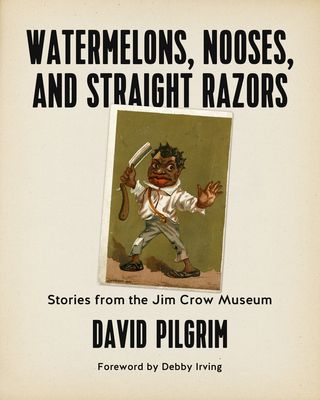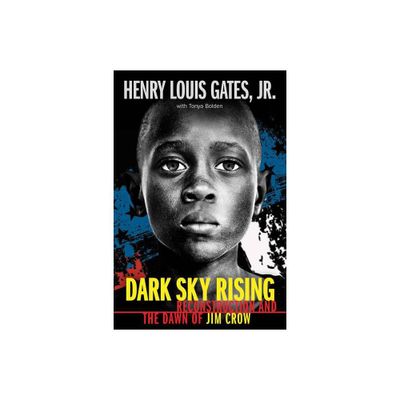Home
Jim Crow: Voices from a Century of Struggle Part 1 (LOA #376): 1876 - 1919: Reconstruction to the Red Summer
Loading Inventory...
Barnes and Noble
Jim Crow: Voices from a Century of Struggle Part 1 (LOA #376): 1876 - 1919: Reconstruction to the Red Summer
Current price: $37.50


Barnes and Noble
Jim Crow: Voices from a Century of Struggle Part 1 (LOA #376): 1876 - 1919: Reconstruction to the Red Summer
Current price: $37.50
Loading Inventory...
Size: OS
*Product Information may vary - to confirm product availability, pricing, and additional information please contact Barnes and Noble
This collection of 80 dramatic firsthand writings by Frederick Douglass, Ida B. Wells, and others brings to life the struggle for racial justice from the Civil War to World War I
A vital resource for the teaching of the history of race in America that traces the ascendency of white supremacy after Reconstruction—and the outspoken resistance to it led by Black Americans and their allies
W.E.B. Du Bois famously identified "the problem of the color-line" as the defining issue in American life. The powerful writings gathered here reveal the many ways Americans, Black and white, fought against white supremacist efforts to police the color line, envisioning a better America in the face of disenfranchisement, segregation, and widespread lynching, mob violence, and police brutality.
Jim Crow: Voices from a Century of Struggle, Part One
brings together speeches, pamphlets, newspaper and magazine articles, public testimony, judicial opinions, letters, and poems and song lyrics—more than eighty essential texts in all—from the end of Reconstruction in 1876 to the bloody “Red Summer” of 1919.
The volume includes writing by both famous and lesser known individuals, including:
Ida B. Wells on the scourge of lynching
Richard T. Greener’s scathing critique of America’s “White Problem"
Charles Chesnutt on the nullification of the Fifteenth Amendment
Booker T. Washington’s historic Atlanta address
John Marshall Harlan’s eloquent and prophetic dissent in
Plessy v. Ferguson;
Mary Church Terrell on segregation in the nation’s capital and the convict lease system
William Monroe Trotter’s dramatic White House confrontation with Woodrow Wilson
Jeanette Carter’s tribute to the men and women who fought back against white mobs in 1919
The volume also presents revealing examples of white supremacist advocacy by Nathaniel Shaler and Benjamin Tillman; testimony about the “Exoduster” migration to Kansas in the 1870s; celebrations of pathbreaking Black musicians and stage performers; writing about the Wilmington insurrection of 1898, the founding of the NAACP, and Black soldiers in World War I; and contrasting editorials from the Black and white press on prizefighter Jack Johnson and the outlaw Robert Charles.
As the teaching of our nation’s history, especially the history of race in America, becomes increasingly contested, this book will serve as a vital resource, a crucial reminder of where we’ve been, how far we’ve come, and how long the road ahead remains.
A vital resource for the teaching of the history of race in America that traces the ascendency of white supremacy after Reconstruction—and the outspoken resistance to it led by Black Americans and their allies
W.E.B. Du Bois famously identified "the problem of the color-line" as the defining issue in American life. The powerful writings gathered here reveal the many ways Americans, Black and white, fought against white supremacist efforts to police the color line, envisioning a better America in the face of disenfranchisement, segregation, and widespread lynching, mob violence, and police brutality.
Jim Crow: Voices from a Century of Struggle, Part One
brings together speeches, pamphlets, newspaper and magazine articles, public testimony, judicial opinions, letters, and poems and song lyrics—more than eighty essential texts in all—from the end of Reconstruction in 1876 to the bloody “Red Summer” of 1919.
The volume includes writing by both famous and lesser known individuals, including:
Ida B. Wells on the scourge of lynching
Richard T. Greener’s scathing critique of America’s “White Problem"
Charles Chesnutt on the nullification of the Fifteenth Amendment
Booker T. Washington’s historic Atlanta address
John Marshall Harlan’s eloquent and prophetic dissent in
Plessy v. Ferguson;
Mary Church Terrell on segregation in the nation’s capital and the convict lease system
William Monroe Trotter’s dramatic White House confrontation with Woodrow Wilson
Jeanette Carter’s tribute to the men and women who fought back against white mobs in 1919
The volume also presents revealing examples of white supremacist advocacy by Nathaniel Shaler and Benjamin Tillman; testimony about the “Exoduster” migration to Kansas in the 1870s; celebrations of pathbreaking Black musicians and stage performers; writing about the Wilmington insurrection of 1898, the founding of the NAACP, and Black soldiers in World War I; and contrasting editorials from the Black and white press on prizefighter Jack Johnson and the outlaw Robert Charles.
As the teaching of our nation’s history, especially the history of race in America, becomes increasingly contested, this book will serve as a vital resource, a crucial reminder of where we’ve been, how far we’ve come, and how long the road ahead remains.


















